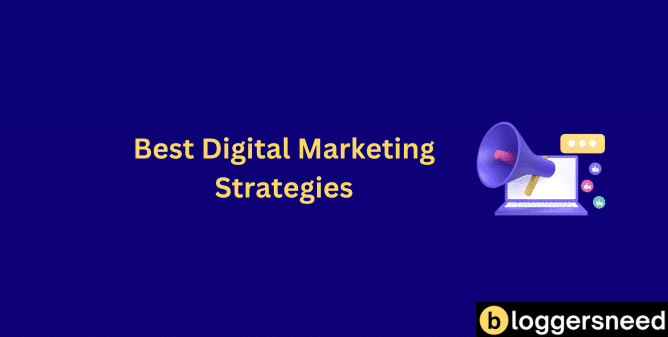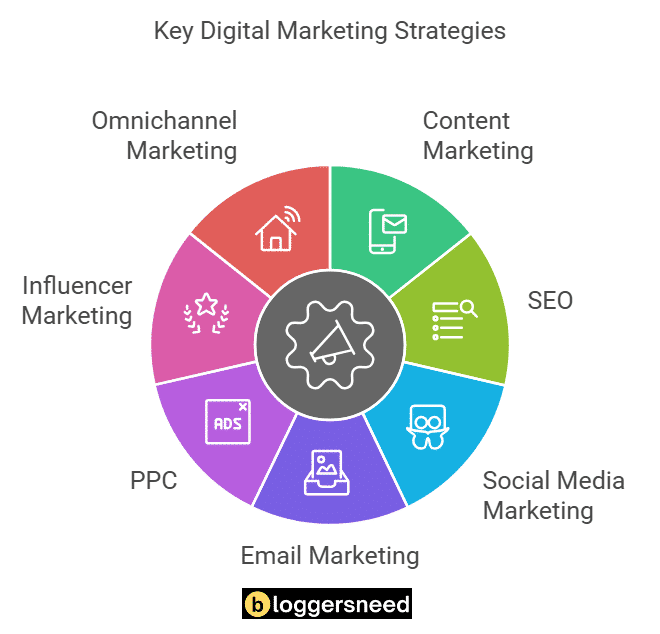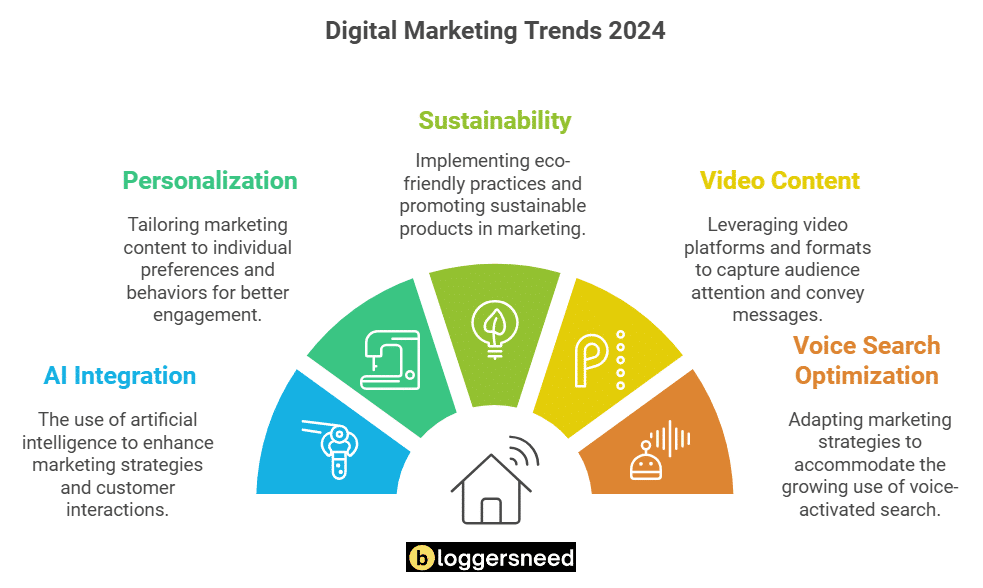
The best digital marketing strategy combines essential tactics tailored to your goals. Start with content marketing to build trust, paired with SEO to boost organic visibility. Use social media to engage your audience and create brand awareness, and email campaigns to nurture leads. For quick results, leverage PPC advertising targeting high-intent keywords. Continuously track performance using analytics tools to refine your approach and adapt to trends like AI and voice search. This integrated strategy ensures your business thrives in a competitive digital landscape.
Table of Contents
What Are Digital Marketing Strategies, and Why Do Businesses Need Tailored Approaches?
Nearly every successful business today relies on digital marketing strategies – coordinated online activities designed to attract, engage, and convert potential customers.
To create an effective strategy, you’ll need to understand your target audience and develop clear brand positioning that sets you apart from competitors. Start with a thorough competitive analysis to identify market gaps and opportunities.
Then, map out your customer journey to guarantee you’re meeting prospects at every touchpoint.
You can’t take a one-size-fits-all approach because each business has unique goals, resources, and challenges. Marketing automation tools help you scale your efforts, but they must align with your specific needs.
What Are the Foundations of Successful Digital Marketing?
The four essential foundations of successful digital marketing include a strong online presence, quality content creation, data-driven decision making, and strategic audience targeting.
To build these foundations, you’ll need to focus on effective brand storytelling that resonates with your target audience while maintaining consistent customer engagement across all platforms.
Your online presence should prioritize user experience through responsive websites and intuitive navigation.
Using data analytics, you can track customer behavior, measure campaign performance, and optimize your marketing efforts in real-time.
When you combine these elements with strategic content creation that addresses your audience’s pain points, you’re setting yourself up for digital marketing success.
Remember to regularly analyze your metrics and adjust your approach based on actual performance data.
What Are the Core Digital Marketing Strategies for Businesses?
You’ll need to master five core digital marketing strategies to effectively promote your business in today’s online landscape: content marketing, SEO, social media marketing, email marketing, and PPC advertising.
Each strategy serves a distinct purpose – content marketing builds trust and authority, SEO increases visibility, social media drives engagement, email nurtures relationships, and PPC generates immediate traffic.
When you’re implementing these strategies together, they create a thorough digital marketing framework that helps you reach your target audience across multiple channels while maximizing your marketing ROI.

1. Content Marketing
Content marketing remains a powerhouse strategy that drives engagement, builds trust, and converts visitors into loyal customers. By using out content marketing tips, you’ll establish your brand as an industry authority while meeting your audience’s informational needs.
Effective storytelling techniques help you connect emotionally with readers and showcase your unique value proposition.
To maximize your content marketing efforts, you’ll need to combine compelling visual content with well-researched written materials. This includes infographics, videos, blog posts, and case studies that resonate with your target audience.
Don’t forget to implement proper SEO integration throughout your content strategy – from keyword research to meta descriptions and internal linking.
Focus on audience engagement by creating interactive content, encouraging comments, and sharing user-generated content across your digital channels.
2. Search Engine Optimization (SEO)
Search Engine Optimization stands as a fundamental pillar of digital marketing success, helping your business achieve greater visibility in search engine results pages (SERPs).
By implementing effective keyword research strategies, you’ll identify valuable search terms that your target audience uses to find products or services like yours.
To maximize your SEO efforts, focus on four key areas: on-page optimization to enhance your content’s relevance, link building to establish authority, technical SEO to improve website performance, and local SEO to target geographical audiences.
You’ll need to optimize meta descriptions, headers, and content structure while ensuring your site’s mobile responsiveness and loading speed meet current standards.
Remember to maintain consistent NAP (Name, Address, Phone) information across platforms for effective local search presence.
3. Social Media Marketing
While traditional marketing channels continue to evolve, social media marketing has emerged as a powerhouse strategy for businesses to connect with their target audience.
You’ll need to master social media algorithms to maximize your content’s visibility and reach across platforms like Facebook, Instagram, and LinkedIn.
To succeed, you must focus on platform selection based on where your target audience spends their time.
Develop an audience engagement strategy through compelling content, meaningful interactions, and timely responses.
Implement consistent content scheduling to maintain steady visibility, and guarantee brand consistency across all platforms through unified messaging, visuals, and tone of voice.
Don’t forget to analyze metrics regularly to refine your approach and adapt to changing platform dynamics.
4. Email Marketing
Despite the rise of newer digital channels, email marketing remains one of the most effective and cost-efficient strategies to nurture customer relationships and drive conversions.
You’ll want to implement email segmentation strategies to target specific audience groups with relevant content that resonates with their interests and behaviors.
To maximize your email marketing success, focus on creating personalized email campaigns that speak directly to your subscribers’ needs.
Set up automated email workflows for welcome sequences, abandoned cart reminders, and post-purchase follow-ups.
Don’t forget to follow email design best practices, ensuring your messages are mobile-responsive and visually appealing.
Track your email performance metrics, including open rates, click-through rates, and conversion rates, to continuously optimize your campaigns and improve ROI.
5. Pay-Per-Click Advertising (PPC)
Beyond nurturing leads through email, your digital marketing strategy should include Pay-Per-Click (PPC) advertising to capture immediate attention and drive targeted traffic.
Through effective PPC strategies, you’ll only pay when interested users click on your ads, making it a cost-efficient marketing approach.
Success in PPC requires mastering several key elements: thorough keyword research to identify high-intent search terms, precise ad targeting to reach your ideal audience, and diligent budget management to optimize spending.
You’ll need to implement conversion tracking to measure campaign performance and adjust your strategy accordingly.
6. Influencer Marketing
Social media powerhouses have transformed modern marketing through influencer collaborations. When you partner with trusted content creators, you’ll tap into their loyal following and leverage their credibility to boost your brand’s visibility.
Successful influencer partnerships rely on selecting brand ambassadors who align with your values and target audience. You’ll find that micro influencers impact engagement rates more effectively than mega-influencers, often generating 60% higher campaign engagement at a fraction of the cost.
Focus on content authenticity rather than follower count to drive meaningful audience engagement.
To maximize your influencer marketing success, you’ll need to track key metrics like conversion rates, engagement levels, and ROI.
Consider utilizing a mix of influencer tiers, from nano-influencers to macro-influencers, based on your campaign objectives and budget constraints.
7. Omnichannel Marketing
Integrating multiple digital platforms into a unified customer experience, omnichannel marketing creates seamless interactions across every touchpoint in the buyer’s journey.
You’ll need to guarantee consistent brand messaging whether your customers engage via mobile apps, social media, email, or your website.
Successful channel integration requires robust data analytics to track customer behavior and preferences across platforms. This insight enables you to deliver personalized messaging that resonates with your audience at each stage of the customer journey.
You’ll want to maintain brand consistency while adapting content formats for different channels.
To implement an effective omnichannel strategy, you should map out your customer touchpoints, integrate your marketing technologies, and continuously analyze performance metrics to optimize the experience.
This approach leads to higher engagement rates and improved customer retention.
How Can Startups Leverage Tailored Digital Marketing Strategies for Growth?
Creating effective digital marketing strategies is essential for startups seeking rapid growth in today’s competitive landscape.
You’ll need to focus on understanding your target audience through data analytics while implementing growth hacking techniques that set you apart through brand differentiation.
Start by identifying your unique value proposition and developing content that drives customer engagement across digital channels.
To maximize your startup’s potential, you’ll want to leverage cost-effective tactics like social media marketing, content marketing, and email campaigns.
Implement A/B testing to optimize your messaging and use analytics tools to track performance metrics.
Don’t forget to maintain consistency across all platforms while adapting your strategy based on real-time data insights.
Remember that successful digital marketing requires continuous optimization and a willingness to pivot when certain approaches aren’t delivering desired results.
How Can Law Firms Build Trust and Authority with Digital Marketing?
Through strategic digital marketing for law firms, they can establish credibility and build lasting trust with potential clients.
You’ll need to showcase your legal expertise through informative blog posts, whitepapers, and video content that addresses common client concerns. Incorporate trust signals like professional certifications, bar memberships, and secure website features.
Client testimonials play an essential role in building online reputation. You should feature success stories and case results while maintaining client confidentiality.
Highlight your community involvement through social media posts about pro bono work, local events, and charitable initiatives. Create educational content that demonstrates your knowledge while remaining accessible to potential clients.
To strengthen your digital presence, maintain active profiles on legal directories and respond promptly to client reviews, showing your commitment to client satisfaction and professional excellence.
What Are the Best Digital Marketing Strategies for a New Product Launch?
For a successful product launch, you’ll need a thorough digital marketing strategy that combines pre-launch buzz, targeted advertising, and engaging content. Start with extensive market research to understand your target audience and develop effective product positioning that resonates with potential customers.
Create a detailed launch timeline that outlines your promotional tactics across multiple channels. You’ll want to implement email teasers, social media campaigns, and influencer partnerships to generate anticipation.
Consider using paid advertising on platforms where your audience spends time, and create valuable content that showcases your product’s unique benefits. Don’t forget to optimize your landing pages and website for search engines to maximize visibility.
Remember to track metrics and engage with customer feedback throughout the launch to adjust your strategy as needed.
What Are the Most Effective Digital Marketing Strategies for E-commerce Businesses?
Successful e-commerce businesses rely on multiple digital marketing strategies working together to drive traffic, boost conversions, and build customer loyalty.
You’ll need to focus on data analytics to understand customer behavior and optimize your conversion rate across all channels. Mobile optimization is essential, as over 70% of e-commerce traffic now comes from smartphones.
To maximize your results, implement targeted email marketing campaigns for customer retention, and use social proof through customer reviews and testimonials.
You should also invest in user experience improvements, including streamlined checkout processes and personalized product recommendations.
Your strategy must include robust SEO practices, paid advertising on platforms where your customers spend time, and engaging social media content that drives traffic to your product pages.
How Can Local Businesses Use Digital Marketing to Increase Visibility?
While e-commerce businesses operate globally, local businesses require a targeted approach to digital marketing that focuses on their immediate geographic area.
To boost your local visibility, you’ll need to optimize your local SEO by claiming and updating your Google Business Profile, guaranteeing consistent NAP (name, address, phone) information across platforms.
Engage with your community through social media by sharing local events and responding to comments. Actively encourage and manage online reviews on platforms like Yelp and Google Reviews, as they greatly impact local search rankings.
Implement targeted advertising on social media and search engines to reach customers within your service area.
Don’t forget mobile optimization – verify your website loads quickly and displays properly on smartphones, as most local searches happen on mobile devices.
What Are the Top Emerging Trends in Digital Marketing for 2025?
Digital marketing trends continue to evolve rapidly in 2025, with artificial intelligence and data privacy taking center stage.
You’ll find AI Integration transforming everything from chatbots to predictive analytics, helping businesses deliver more targeted campaigns and improved customer experiences.
Voice Search optimization has become vital as more consumers use smart speakers and mobile devices to find products and services.
Personalization Trends are reshaping how you’ll connect with audiences, utilizing data-driven insights to create tailored content and recommendations.
You’ll also notice Interactive Content gaining momentum through AR experiences, polls, and quizzes that boost engagement rates.
Sustainability Marketing isn’t just a buzzword anymore – it’s becoming a core component of digital strategies as consumers increasingly demand eco-friendly practices and transparent environmental commitments from brands they support.

How Can Businesses Set SMART Goals and Measure Success in Digital Marketing?
Setting clear, measurable objectives forms the foundation of any effective marketing strategy. To implement successful goal setting, you’ll need to follow the SMART framework: Specific, Measurable, Achievable, Relevant, and Time-bound.
Start by aligning your digital marketing goals with your overall business objectives to guarantee strategic alignment.
When tracking success, focus on key performance metrics that matter most to your business. These might include conversion rates, website traffic, engagement rates, or ROI.
Regular data analysis helps you understand what’s working and what isn’t. You’ll want to establish baseline measurements, set realistic targets, and monitor progress through analytics tools.
Remember to adjust your strategy based on insights from your success tracking efforts, guaranteeing continuous improvement and optimization of your digital marketing campaigns.
What Are the Common Pitfalls to Avoid in Digital Marketing?
Businesses frequently stumble over several common digital marketing pitfalls that can derail even the most promising campaigns. Among the critical mistakes to avoid, budget misallocation often tops the list, with companies spending too much on low-performing channels while underfunding effective ones.
You’ll also want to watch out for audience misidentification, which occurs when you’re targeting the wrong demographic or using inappropriate messaging for your ideal customer.
Neglecting analytics is another serious error that prevents you from making data-driven decisions and optimizing your campaigns effectively. You can’t improve what you don’t measure.
Additionally, inconsistent branding across different platforms can confuse your audience and dilute your message. Maintain a unified voice, visual identity, and messaging strategy across all your digital marketing channels to build trust and recognition.
Affiliate Disclosure: Some of the links in this post are affiliate links, which means I may earn a small commission if you make a purchase through those links. This comes at no extra cost to you. Thank you for your support!